Speech is Beautiful

Top 10 Word Finding Strategies

Do your students struggle with word finding?
It’s a chronic concern with many students on my caseload — and research backs it up. According to Dockrell, Messer, George, and Wilson (1998) 23% of children on a speech-language pathologist’s caseload will have difficulty with word finding.
What is Word Finding?
My students usually shrug their shoulders when they don’t know an answer to a question. I spend a lot of time vocabulary building with my students, but that’s a different discussion. Word finding means that the student can’t think of words they already know or have exposure to.
What are the 3 Main Types of Word Finding Errors?
When researchers look more closely at word finding errors, they find three main types of errors (McGregor 1997):
- Semantic substitutions (Saying “horse” for “burro”)
- Phonological errors (Saying “manza” for “manzana” — ‘apple’ in Spanish) — This type of error is less common.
- “Don’t know” errors (My students’ errors are often in this group)
10 Word Finding Strategies
While I love learning about research (I geek out on it just a bit), I really need specific therapy techniques to help my students. So how do we help students with word finding difficulties in therapy? I’ve compiled a list of ten strategies to use in therapy:
- Priming — Start out a therapy task with a review of all of the relevant vocabulary words in a lesson. This activates the student’s categorical vocabulary knowledge and gets their brains ready for the task ahead.
- Vocabulary drill — Throw it back to traditional speech therapy and get out those picture cards in categories and have a student name, name, name. Pair it with a game!
- Narrative intervention — Bring out the books, preferably related to grade-level curriculum, and focus on story retell. Recalling the parts of the story and the key vocabulary with help the student learn and retain important words. Must be done consistently and story grammar visuals are beneficial, too.
- Visualization — When a student is stuck, ask the student to close their eyes and imagine the object. Then ask him/her to say what they see in their mind.
- Providing phonemic cues — If you know the word the student is search for, provide the first sound. For example, if they are looking for the word “mug,” say, “It starts with ‘m.'”
- Providing semantic cues — Again, if you know the word that the student can’t find, ask the student questions about the category, “Is it a tool?” or the function “It is used to hit nails.”
- Reverse engineer their error — If the student says “tiger” for “lion,” consider offering other associated words , like “It’s an animal that lives in Africa like a zebra, gazelle, or a cheetah.”
- Providing the opposite word or a similar word — Telling the student the antonym of the target word or a synonym is another way to have the student think creatively to locate the missing word.
- Gesture — So many of my students use gesture naturally when they struggle to name a word. But pantomine or gesturing can really work to recall that missing word.
- Word vomit (aka Circumlocution) — Ask the student to just say as much as they can about the word and sometimes then they land on it.
I hope that this blog post helps you by offering you new ideas that you can use during your next therapy session. Make sure to join my email list (see very top bar to opt-in) for more interesting and helpful information.
Share this:
- Click to share on Twitter (Opens in new window)
- Click to share on Facebook (Opens in new window)
January 7, 2016 at 3:04 pm
I LOVE this post! I use several of those strategies with kids on my caseload, but I hadn’t thought of others. Thanks!
Evidence-Based Blog and Materials for SLPs!
- $ 0.00 0 items
Word-Finding Remediation: EBP Resources for SLPs

If you participate in various speech language and education related forums you may frequently see a variation on this question: “How would you assess and treat a child with word finding difficulties?” Before I provide some recommendations on this matter I’d like to talk a little bit about what word-finding is as well as what impact untreated word finding issues may have in a child.
So how do word-finding deficits manifest in children? In a vast variety of ways actually! For starters they could occur at the word level, conversational level or both. Below are just a few examples of word-level errors from German, 2005:
- “ Slips of the tongue” or semantic word substitutions such as fox→ wolf; clown → gnome
- “Tips of the tongue” or responses characterized by word blocks, pauses, fillers (um, ah, etc), repetitions, metalinguistic or metacognitive comments such as “I know”, “I don’t know”, etc.
- “ Twists of the tongue” which include phoneme omissions, substitutions and additions such as cactus → catus; octopus →opotus, etc.
Further complicating the above may be the speed (some delay or no delay) with which they retrieve words as well as accuracy/inaccuracy of their retrieval once the words are retrieved. Additionally, a number of secondary characteristics may also play a role which include gestures (e.g, miming a word, frustration, etc) as well as extra verbalizations (metalinguistic and metacognitive comments).
At discourse level, students with word-finding deficits typically occupy one of two categories: productive vs. insufficiently productive language users. While their narrative language profile may be marked by frequent pauses, word fillers, as well as word and phrase revisions and repetitions.
Moreover, word-retrieval deficits are not limited to discourse, they are also found in reading tasks. There word-finding issues may manifest as omitted words or almost stuttering/cluttering like behaviors. Interestingly German and Newman (2005; 2007) found that students with word retrieval difficulties are able to successfully correctly identify the words they missed during oral reading tasks in silent reading recognition tasks.
Difficulty coherently expressing oneself can have significant detrimental effect on the child’s academic performance, social relationships and ultimately self-esteem, which without appropriate intervention may potentially lead to poor school performance as well as mental issues (e.g., anxiety, depression, etc.)
So how can word-finding deficits be assessed for free? You can assess word-finding at narrative level using the clinical narrative assessment .
At word level you can adapt single word standardazed tests such as t he Expressive One Word Picture Vocabulary Test (EOWPVT) in order to test the efficiency of the student’s word retrieval in single word context. Here, the goal is not necessarily to test their expressive vocabulary knowledge but rather to see what type of word finding errors the students are making as they are attempting to correctly recall the visually shown word. Depending on the extent of the child’s word finding deficits you may have some very useful information to derive from the presentation of this test.
To illustrate, I recently informally administered applicable portions of this test to a four-year old Russian speaking preschooler. Based on his performance I was able to determine that his errors are primarily Error Pattern 3 – Form & Segment Related Phonologic Errors or Tw ists of the tongue”. This was further confirmed when I had the child to participate in the narrative retelling task.
So where can we find reputable evidence-based practice information on effective assessment and treatment strategies for word finding deficits? Start with Dr. Diane German’s website, entitled Word Finding . She has a lot of good information to offer there for free to both speech language professionals as well as parents. Take a look at her recommended materials and resources, they are very helpful when it comes to assessing and treating children with word finding deficits. Now have fun and evidence-base practice on!
PS. Calculating percentage of word-finding difficulties in children .
Dr. German recommends the following procedure : “ Obtain a language sample of 50 T-units (kernel sentence + subordinate clause) in length using stimuli of interest to the learner (or use one you have as long as all utterances in the sample are included). Then asses each T unit for the presence of one or more of the following 7 WF behaviors in discourse: repetitions, revisions (reformulations), substitutions, insertions (comment that reflects on the WF process like I cannot think of it, etc. ), time fillers (um, er, uh), delays with in the T unit, and empty words (thing, stuff). Learners with WF difficulties manifest one or more WF behaviors in 33% or more of their T units (often 40% – 50%). Typical language learners display WF behaviors in 19% or less of their T-Units (German, 1991) “ ( German, 2015: SIG 16 Topic: Assessing Word-Finding Skills )
Helpful Related Materials :
- Clinical Assessment of Narratives in Speech Language Pathology
- Narrative Assessments of Preschool, School-Aged, and Adolescent Children
- Narrative Assessment Bundle
- The Checklists Bundle
- Creating Functional Therapy Plan
References :
- Dockrell, J.E., Messer, D., George, R. & Wilson, G. (1998). Notes and Discussion Children with word-finding difficulties-prevalence, presentation and naming problems. International Journal of Language & Communication Disorders, 33 (4), 445-454.
- German, D.J. (2001) It’s on the Tip of My Tongue, Word Finding Strategies to Remember Names and Words You Often Forget. Word Finding Materials, Inc.
- Dr. German’s Word Finding Website: http://www.wordfinding.com/
Disclaimer: The views expressed in this post are the personal opinion of the author. The author is not affiliated with dr. Diane German nor PRO-ED publications in any way and was not provided by them with any complimentary products or compensation for this post.
1 thought on “ Word-Finding Remediation: EBP Resources for SLPs ”
[…] the past, I have written several posts on the topic of word finding difficulties (HERE and HERE) as well as narrative assessments (HERE and HERE) of school-aged children. Today I am […]
You must be logged in to post a comment.
- Adolescents (28)
- Ankyloglossia (1)
- APD Validity (7)
- App Review (18)
- Articulation (17)
- Assessment (118)
- Autism (19)
- behavior strategies (14)
- Bell Curve Charting (3)
- Bilingual (17)
- Blogging About Research (25)
- Book Companion (10)
- CEUs/CMHs (4)
- Checklist (23)
- Childhood Apraxia of Speech (6)
- Clinical Assessment (19)
- Clinical Fellows (1)
- CMH Quiz (1)
- Context Clues (3)
- Contextual Intervention (8)
- Controversial Practices in Health Care (7)
- Critical Thinking (22)
- Cues and Prompts (4)
- Development milestones (16)
- Developmental Disabilities (12)
- Differential Diagnosis (20)
- Down Syndrome (6)
- Dysgraphia (7)
- Dyslexia (35)
- Dyslexia Assessment (12)
- Dyslexia/Reading Disability (30)
- Early Intervention (18)
- Elementary (32)
- emotional and behavioral disturbances (34)
- Emotional Intelligence (5)
- Evidence-Based Practice (EBP) (50)
- Executive Function (15)
- Facebook (7)
- Fairy Tales (1)
- feeding (3)
- Following Directions (2)
- Fragile X Syndrome (3)
- Freebie (13)
- genetic syndromes (14)
- Giveaway (71)
- Independent Educational Evaluations (IEEs) (13)
- Insight (15)
- insurance coverage (2)
- Intake forms (6)
- internationally adopted children (28)
- Kindergarten (11)
- language delay (74)
- Language Disorder (68)
- language stimulation (30)
- Learned Helplessness (1)
- Learning Disability (55)
- Life Skills (3)
- listening comprehension (29)
- Literacy (42)
- Metacognition (4)
- Metalinguistics (12)
- Middle School (24)
- Morphological Awareness (8)
- Motor Speech Disorders (5)
- multicultural (24)
- Multisensory Stimulation (9)
- Narratives (10)
- News Release (44)
- NJAC 6A:14-3.6 (1)
- Nonfiction Text (2)
- orofacial assessment (4)
- Parent Consultation (4)
- Parent Tips (2)
- Phonemic Awareness (24)
- Phonics (9)
- Phonological Awareness (16)
- Picture Books (11)
- preschoolers (52)
- Problem Solving and Verbal Reasoning (34)
- Processing Disorders (25)
- Professional Consultation (2)
- Professional Development (3)
- Psychiatric Impairments (3)
- Reading Comprehension (19)
- Reading Fluency (17)
- Report Writing Tips (12)
- resource websites (33)
- Review (37)
- Rewards (1)
- Russian (6)
- Science of Reading Literacy Certificate for SLPs (1)
- Screening (1)
- Search Tips (2)
- Sequencing (2)
- Severe Disabilities (12)
- SLP Efficiency Bundles (3)
- Smart Speech Therapy Article (77)
- Social Communication (25)
- social pragmatic language (70)
- Social Thinking® Products (2)
- Special Education Disputes (14)
- speech language pathology (208)
- Speech-Language Report Tutorials (12)
- SPELL-Links/Learning By Design (3)
- Spelling (12)
- stuttering (5)
- Summer Learning Loss (1)
- Test Review (16)
- Thematic Intervention (13)
- Toddlers (12)
- Tongue Tie (1)
- Translanguaging (5)
- Treatment Suggestions (112)
- Trivia Night (5)
- Video Modeling (1)
- Vocabulary (42)
- Wh- Questions (2)
- word-finding (12)
- Writing (16)

Word Retrieval Resources for Language Therapy
- Literacy and Language Therapy
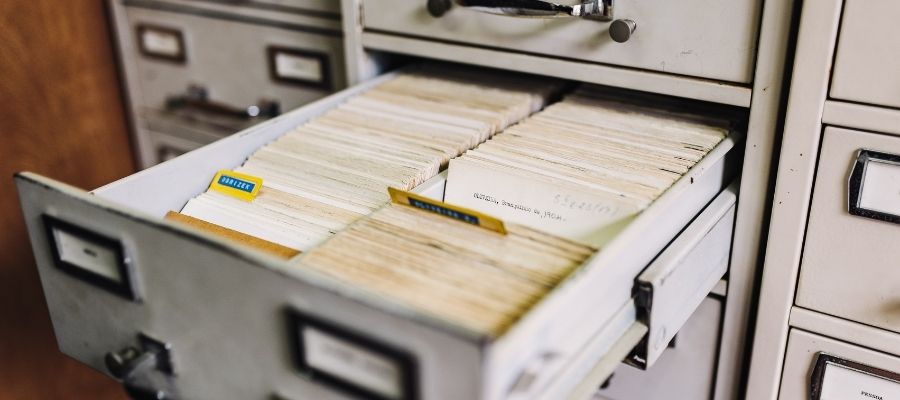
WORD RETRIEVAL… Where is that word anyway?!
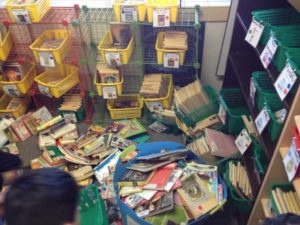
Finding all of the books on the floor is what a child who has word retrieval deficits experiences. They have difficulty finding a word that they know and understand and have used before. They must become detectives and mentally sort through numerous disorganized books or categories to find the correct word. This can be time consuming, frustrating, and embarrassing!
“We store vocabulary in our heads like we store books in a library… so when we want to find the word we want to use and quickly find it… you can go into the library and find all of the books on the floor.”
As SLPs, children often cross our paths who are experiencing word retrieval deficits. This is because it is not uncommon for a child with a language disorder to have word retrieval difficulties. Word retrieval difficulties make it difficult for children to participate in social interactions and academic tasks such as telling narratives. The good news, however, is that we can teach them strategies to find the words they want at the appropriate time!
Watch how an SLP and school helped Aroob, a child recovering from a stroke, with her word retrieval difficulties and empowered her as a communicator.
Here are some resources to help you target word retrieval difficulties during speech therapy!
General websites:.
Word retrieval activities
6 activities to improve word retrieval
More word retrieval strategies!
Word Finding Diagram
WORKSHEETS for Word Retrieval:
Memory materials
Complete word pair game
Fun at the circus
BOOKS for Word Retrieval:
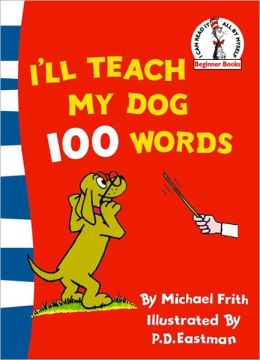
I’ll Teach My Dog 100 Words
Learn 100 new words in a novel way… teaching a dog!
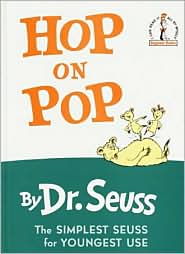
This classic Dr. Seuss book is full of poetry and rhyme.
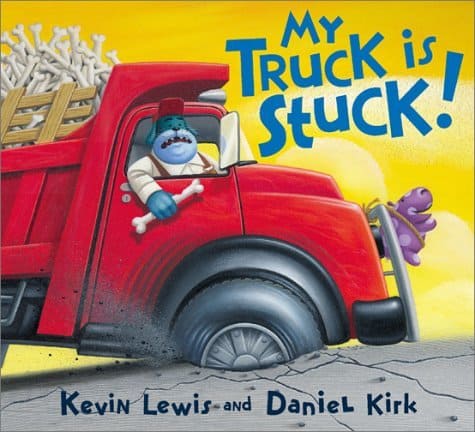
My Truck is Stuck!
Will the engines be able to get the truck unstuck?
How many engines does it take to get the struck unstuck?
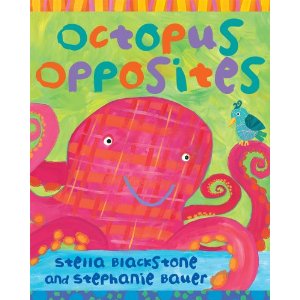
Octopus Opposites
Learn opposites with this friendly octopus.
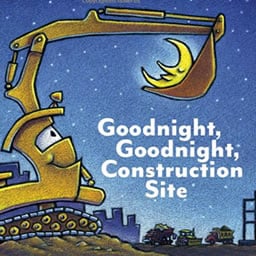
Goodnight, Goodnight, Construction Site
Target semantic classes with this book including vehicles, tools, and occupations.
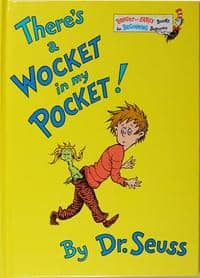
There’s a Wocket in My Pocket
In this silly Bright and Early Book classic by Dr. Seuss, a young boy goes exploring in his house and finds an array of fun characters!
APPS for Word Retrieval:
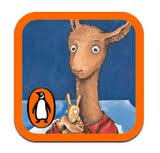
Llama Llama Red Pajama $4.99
Llama llama red pajama is waiting, waiting for his mama. Motivate young children with this rhyming book!

Word Retrieval $9.99
This app was also created by an SLP and based on research on remediation of word retrieval.
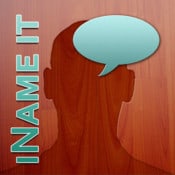
iName it $14.99
iName it was created by an SLP and is specifically designed to help individuals with difficulty recalling the names of common items found in the home.
Submit a Comment Cancel reply
Your email address will not be published. Required fields are marked *
Save my name, email, and website in this browser for the next time I comment.

Get a complimentary continuing ed. course & E-book on Common Disorders.
30,000+ Subscribers
- Articulation / Speech Sound Disorders
- Increase Your Effectiveness – Tips for SLPs
- Multilingual Learners – Evaluation and Therapy
- News and Events
- Speech Language Evaluations
- Speech Therapy Activities
- Speech Therapy for Special Populations
- Teletherapy
- Uncategorized
16 Hours of CEUS and all the Information You Need to Serve Diverse Children Well. Be the Expert Your Colleagues Need.

This is a sidebar for News and Events
And get a complimentary continuing ed. course & e-book on Common Disorders.
30,000+ subscribers
One Therapy Strategy – All Children. ALL means ALL! Bilingual, diverse, every disorder, and classroom goals supported too!
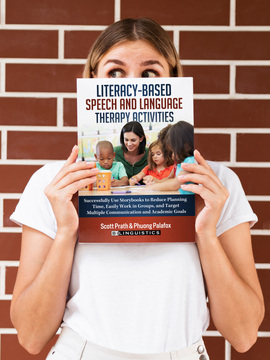
- Keyword Search Search
Word Games and Aphasia
Games are a great way to continue practicing word use at home. They can reinforce speech therapy work or keep the mind active during the early stages of Primary Progressive Aphasia. Word games will keep you interacting with letters, but even visually-based activities are great for getting the conversation rolling. Look at some of the options below to see if you can work them into a fun activity night.
Crosswords Together
Team up with another person to figure out crossword puzzle clues. The person with aphasia can be the thinker and speaker, and the person without aphasia can be the writer. The best part is that there is no time limit. Stretch out solving a puzzle by spending a few days tackling the clues.
You can also team up for other word games like Scrabble. Play regular Scrabble two-on-two, or opt for Scrabble Junior , which is a streamlined version of the game with multiple difficulty levels.
Board Games
There are plenty of word-oriented board games you can play to stretch your mind. ThinkFun’s Zingo has the player creating three-letter words. Quiddler’s words get longer with each round, beginning with three letters, too.
Word Game Apps
There are dozens of word apps in both the iPhone and Android app stores. Word Search Pro has free word find puzzles. Pictoword gives the player picture clues for finding a word. For example, giving a picture of a beach (sand) and a witch (wich) to put together to form “sandwich”. Words With Friends is like a giant, on-going game of Scrabble that you can play with friends or family over the phone.
Talking Games
Games don’t have to be focused on words to be helpful. Trivial Pursuit has general sets, like the original Genus edition, as well as specialty sets. You can target by year, such as the Baby Boomer edition or pop culture topic, such as Doctor Who. Answering trivia questions gets you thinking and speaking.
What are your favourite games for supporting word use ?
Image: Paolo Soro via Flickr via Creative Commons license
Stay Informed, Join Our Newsletter

General Aphasia
Announcing the 2024 Barbara Martin Aphasia Research Grant

Night of Aphasia Arts 2024

What Did the NAA Accomplish in 2023?
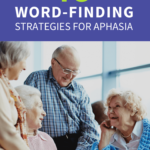
How To: Word-Finding Strategies for Aphasia
5 min read
We all have little tricks we use to help us in our daily lives. Some of these strategies help us prevent problems before they happen, like setting a timer on the oven so we won’t forget to take out the roast. Other strategies allow us to solve problems after they arise, like turning the TV down when we can’t hear someone talking from the next room. The more strategies we know, the more likely we are to successfully solve problems.

The Problem: Word-Finding Difficulties
For people with aphasia, the most common problem is not being able to think of the word they want. They might try to solve this problem by using a filler word: that thing, the whatchamacallit, oh you know, whatsherface . These generic words and phrases are devoid of meaning, so they fail to communicate the intended message. When communication breaks down, it’s time to use a strategy.
The Treatment: Word-Finding Strategies
There are many word-finding strategies people with aphasia can use when they can’t think of the word they want to say. Each person will find some strategies more helpful than others, so it’s a good idea to practice them all to learn which ones work best for you. Often a combination approach is most useful, trying one and then another. Each strategy gives a bit more information to the listener and stimulates the area of the brain that’s refusing to give up the word.
Here are 10 helpful word-finding strategies for people with aphasia:
Just give it a second or two. With a bit of extra time, the word may pop out on its own. Be patient with yourself, and ask your partner to give you time.
“Do you have any… um… oh… one sec… any scissors?”
Give the listener information about what the thing looks like or does. Any extra information can help them know what you’re talking about. It may even help you to say the word.
“Do you have any… oh dear, those things that cut? Scissors!”
Association
See if you can think of something related. Even if it’s not quite right, it may prompt the word or convey the meaning.
“Do you have any… ah my… they’re not knives, but like that?”
Think of a word that means the same or something similar.
“Do you have any…clippers?”
First Letter
Try to write or think of the first letter of the word. Scan the alphabet to see if any letter triggers anything for you.
“Do you have any… (traces an S in the air)… scissors?”
Use your hands or body to act out the word, like playing a game of charades. Even gesturing with your hands in a non-specific way or tapping the table may help activate the brain.
“Do you have any… (makes cutting gesture with fingers)?”
Sketch out a quick picture of what you’re trying to say. You don’t have to be an artist to use drawing to communicate.
“Do you have any… (draws scissors on a notepad)?”
Think if there’s somewhere the word is written down or pictured. A communication notebook, the Contacts app in your phone, or a ticket stub in your pocket may hold the word.
“Do you have any… (points to scissors in a picture dictionary)?”
Narrow it Down
Give the general topic or category. Is it a person, place, or thing? A family member or a friend? Stating the topic can help your listener predict what you might be trying to say by providing some context.
“Do you have any…oh…they’re office supplies.”
Come Back Later
If you can’t think of the word and your partner can’t guess, it’s okay to give up for now. Our brains work out problems while we do other things, so it’s possible the word will simply pop out later. This is a last resort, so try other strategies first.
“Do you have any… [tries every other strategy]… oh, never mind… I’ll ask you later.”
Download these tips now!
Are these tips useful? Get your free PDF of the Top 10 Word-Finding Strategies for Aphasia .
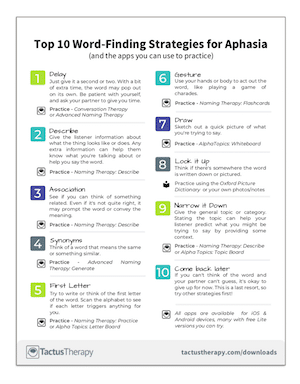
In addition to receiving your free download, you will also be added to our mailing list. You can unsubscribe at any time. Please make sure you read our Privacy Policy and Terms & Conditions .
Training Word-Finding Strategies using Apps
It’s important to practice using word-finding strategies in a supported environment with the help of a speech therapist or trained partner. The more you practice a strategy, the easier it will be to use when you need it. Many of the Tactus Therapy apps for aphasia can be used to practice word-finding strategies in the clinic or at home.
Naming Therapy
To practice describing (strategy #2), giving associates (strategy #3) and naming the category (strategy #9), use the Describe activity in Naming Therapy . The icons surrounding the pictures ask you questions that make you think about the various features of the objects and actions. The activity is based on the evidence-based treatment of semantic feature analysis .
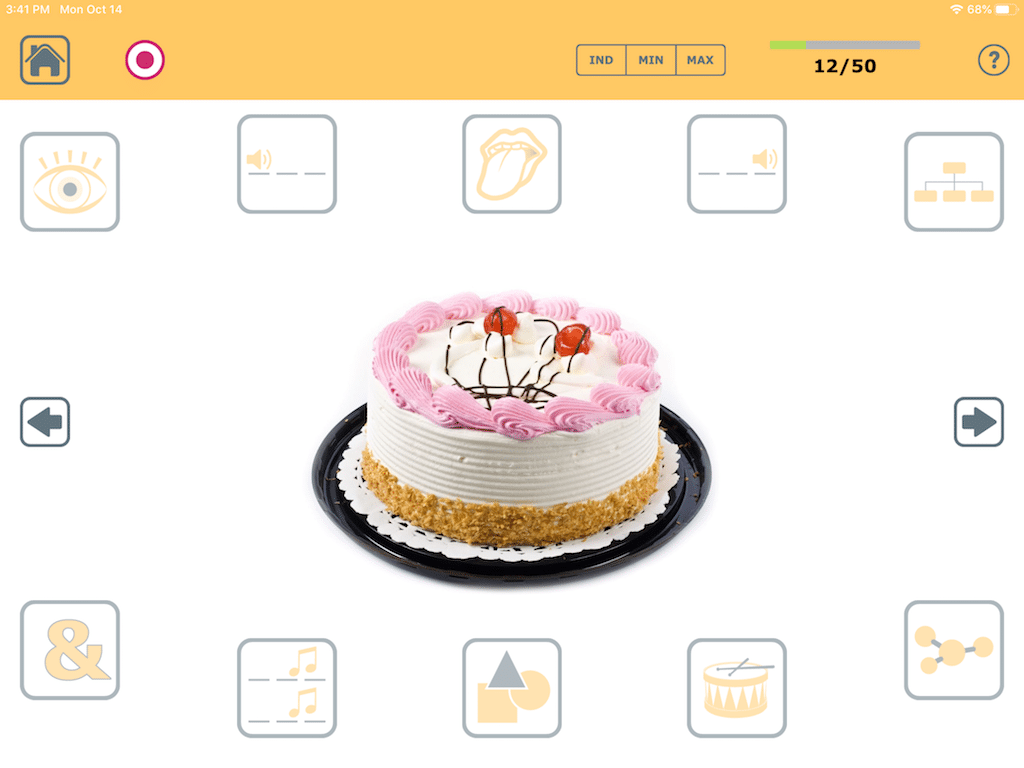
Use the Naming Practice activity to give yourself the first letter of the word (strategy #5). The cueing hierarchy gives you increasingly helpful hints to say the word. If you find the First Letter cue useful, you can start trying to think of the first letter yourself.
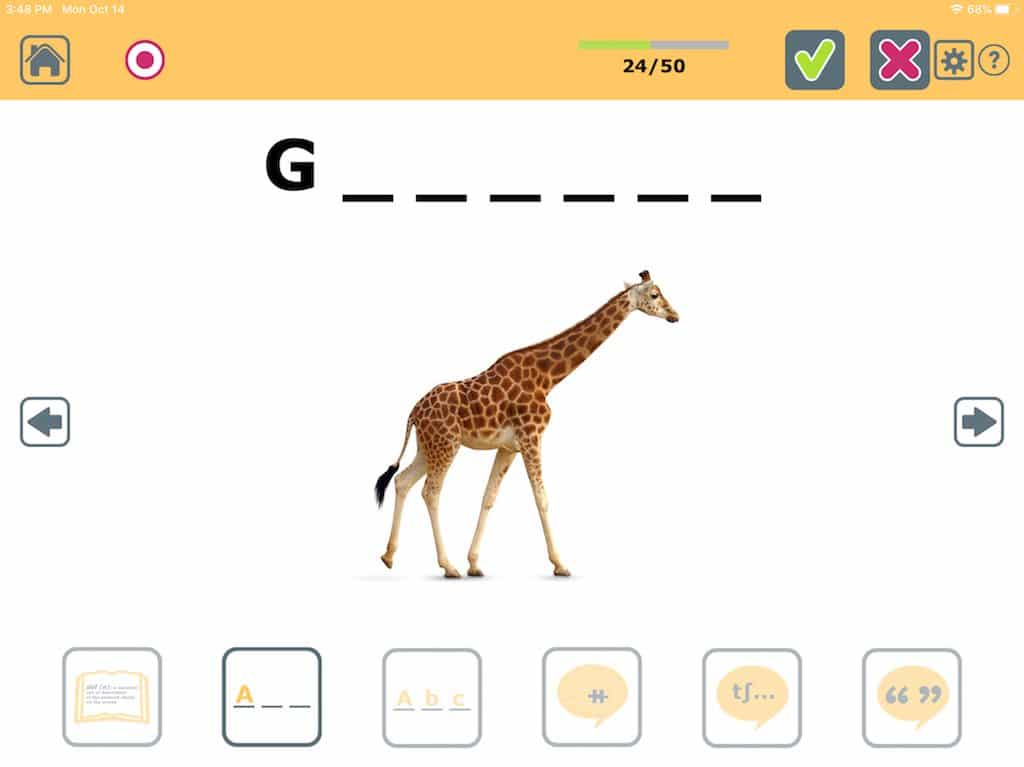
Practice gesturing words (strategy #6) using the 700+ words in the Flashcards activity.
Say the right word more easily when you learn the strategies that help you communicate with this popular word-finding app.
Buy Now Try for Free Learn More
Traveler’s dictionaries and ESL photo dictionaries are excellent communication tools. The Oxford Picture Dictionary is a staple, and comes in an app . Other great apps include BabelDeck and ICOON . Put them on your iPhone or iPad so you’ll have them when you need them (strategy #8).
Advanced Naming Therapy
Practice coming up with synonyms (strategy #4) using the Generate activity in Advanced Naming Therapy .
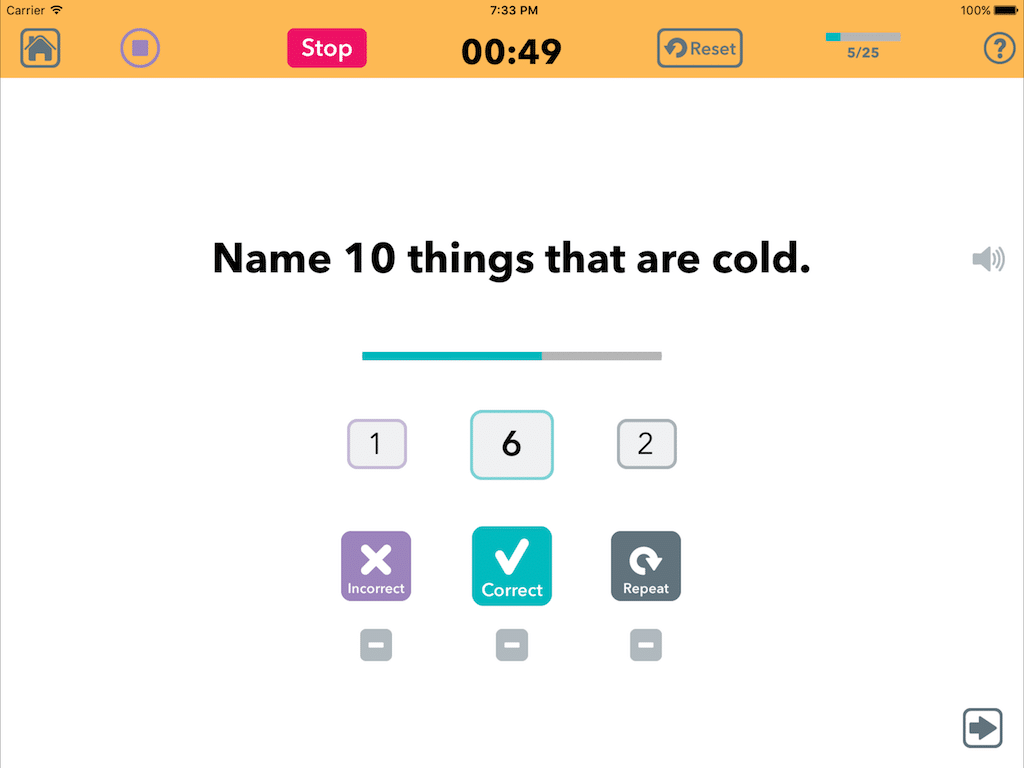
This app also provides an excellent opportunity to practice using all the word-finding strategies when you talk about the fun pictures in the Describe activity and discuss the concepts in the Compare activity.
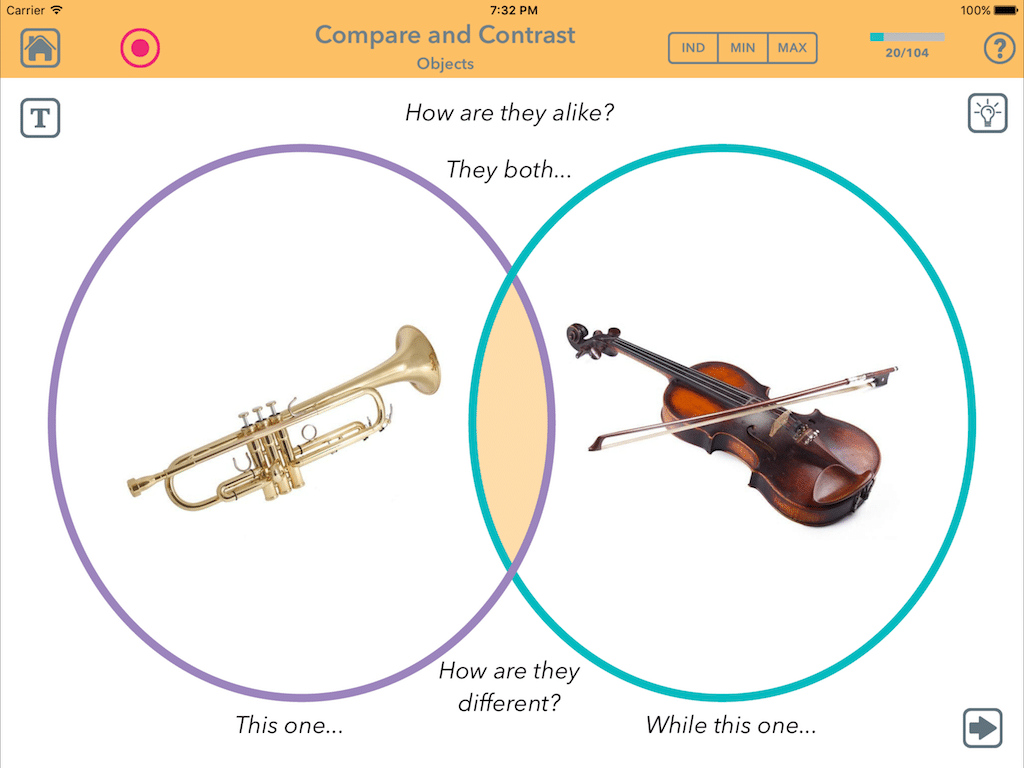
Express yourself better with challenging word-finding exercises for aphasia and cognitive-communication problems.
AlphaTopics
The whiteboard feature of AlphaTopics is perfect for writing the first letter or whole word (strategy #5) or for drawing a quick picture (strategy #7).
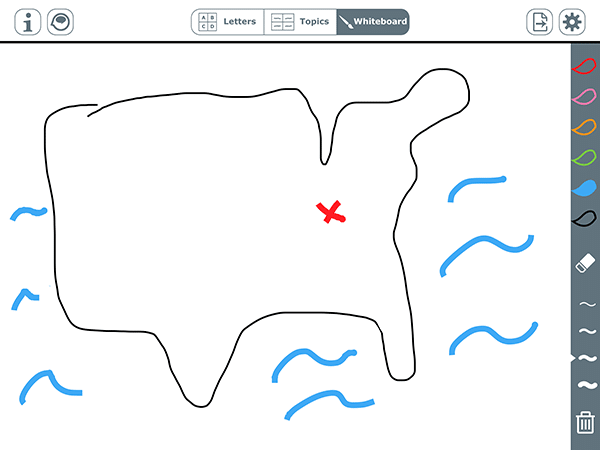
Use the letter board to scan the alphabet (strategy #5) or the topic board to help you narrow-in on the subject (strategy #9).
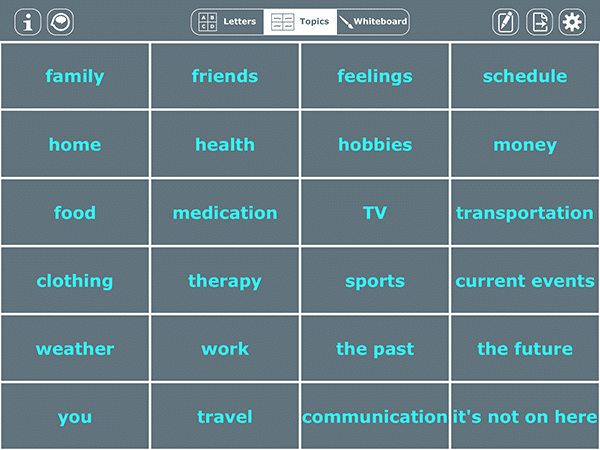
AlphaTopics AAC
Enhance & clarify natural speech with this simple yet powerful augmentative communication app for dysarthria & aphasia.
Buy Now Learn More

Conversation Therapy
Once you’ve learned all these strategies, you can put them to use by answering the 10 different question types in Conversation Therapy . Ask for a few extra seconds (strategy #1) to think of the word when you get stuck. Then try the other strategies if the words still won’t come.
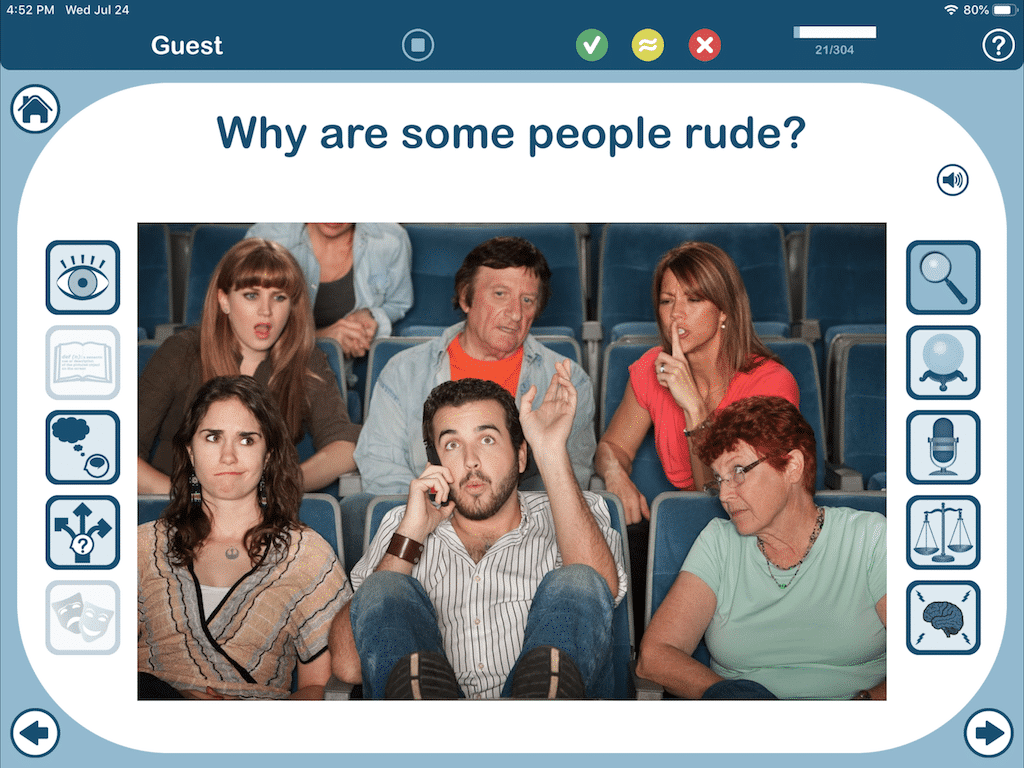
Engage in real-life discussions with pictures & questions that get people talking to practice communication strategies.
Not sure which apps to try? Our App Finder can help! Most apps have a free version for you to try.
Like this article? Learn “How To” do a lot more evidence-based speech therapy treatments in our full series of How To articles .
If you liked this article, Share It !

Megan S. Sutton , MS, CCC-SLP is a speech-language pathologist and co-founder of Tactus Therapy. She is an international speaker, writer, and educator on the use of technology in adult medical speech therapy. Megan believes that technology plays a critical role in improving aphasia outcomes and humanizing clinical services.
More in ‘ How To ’

How To: Treat Wernicke’s Aphasia
If you're looking for information on how to treat Wernicke's aphasia, it's probably because there isn't much. Learn where to start and what to do here.
10 min read

How To: Phonological Treatment for Writing
A step-by-step guide to doing phonological treatment for agraphia, an evidence-based speech therapy technique to improve writing in people with aphasia.

How To: Communication Partner Training (CPT)
A step-by-step guide to evidence-based communication partner training(CPT) to improve conversation for aphasia or TBI. Free handout to guide you through identifying and training partners.
7 min read

How To: Attentive Reading and Constrained Summarization (ARCS)
A step-by-step guide to doing Attentive Reading & Constrained Summarization (ARCS), an evidence-based speech therapy technique to improve discourse in aphasia.

How To: Melodic Intonation Therapy (MIT) for Severe Aphasia
A step-by-step guide to doing Melodic Intonation Therapy (MIT), an evidence-based speech therapy technique to improve non-fluent aphasia and apraxia of speech.
8 min read

How To: Spaced Retrieval Training for Memory
A step-by-step guide to doing Spaced Retrieval (SR), an evidence-based therapy technique to improve recall of information for people with memory impairments.

How To: Multiple Oral Re-Reading (MOR)
A step-by-step guide to doing Multiple Oral Re-Reading (MOR), an evidence-based speech therapy technique to improve reading fluency in people with aphasia and alexia.

How To: Response Elaboration Training (RET) for Sentences in Aphasia
A step-by-step guide to doing Response Elaboration Treatment, an evidence-based speech therapy protocol to improve sentences for people with aphasia.
6 min read

How To: Anagram, Copy, and Recall Treatment for Writing
A step-by-step guide to doing Anagram, Copy, and Recall Treatment (ACRT), an evidence-based speech therapy technique to improve writing in people with aphasia and agraphia.

How To: Phonological Components Analysis (PCA) Treatment for Aphasia
A step-by-step guide to doing Phonological Components Analysis, an evidence-based aphasia therapy protocol to improve anomia after stroke or brain injury.
4 min read

How To: Cueing Hierarchy for Word Finding in Aphasia
Cueing hierarchies are a tried and true part of aphasia therapy, but what exactly are they? Find out the details in this informative guide for word finding treatment.

How To: Semantic Feature Analysis (SFA) for Anomia
A step-by-step guide to doing Semantic Feature Analysis, an evidence-based aphasia therapy protocol to improve anomia after stroke or brain injury with a free handout.

How To: Verb Network Strengthening Treatment (VNeST)
A step-by-step guide to doing VNeST treatment to improve word finding after a stroke. Learn how it works, how to do it, and how an app can help promote independence & intensive practice.

How To: Visual Scanning Treatment for Neglect
A step-by-step guide to doing visual scanning treatment, an evidence-based cognitive therapy technique to improve visual attention in people with right or left neglect after stroke or brain injury.

Word-finding Activities for Speech Therapy
Jan 22, 2014 | 10 and up , 12 years and up , 14 years and up , 3-6 year-olds , 6-8 year-olds , 8 years and up , Language , Strategies to Encourange Language Development , Word Finding

On that note, this week I was talking to a good friend, Jan Schwanke, who happens to be a speech-language pathologist specializing in Word-finding (WF) therapy. She has worked closely with Diane German, doing research and presenting at ASHA. I was asking her for new ideas for therapy to build word retrieval in fun and effective ways.
I wanted to share her new, growing website which is a great resource for Word-finding therapy. The authors of this website aim to provide a place where SLP’s can share their ideas for therapy including a growing list of phonemic or mnemonic cues. Helpful charts contain common vocabulary, divided by school age groups–Pre-Primary (K-2), Intermediate (3-5), Middle School (6-8), and High School–listed alphabetically. The idea is to check this list before re-inventing the wheel, and if your target word isn’t listed, add it with your ideas to share for the next SLP!
Does your student have trouble coming up with “diverse” in science class? Try the cue, “divers” with a picture of two synchronized divers going into a pool. Studying Appalachia in a social studies land form unit? Try giving your student a visual and auditory cue of “apple on a plate.”
The site includes ideas gathered from therapists under “I Need a Cue” and instructions on “How to Add Information” as well. According to the website, “On our ‘How to Add Information’ page, we offer a step-by-step tutorial to help you add your ideas. This same page explains how to use Dr. Diane German’s phonemic or mnemonic cues. Research supports the efficacy of using these cues for children and adults with word-finding difficulties.”
So make use of this budding resource and add your tips to the list so we can all benefit.
Any other therapy sources for word-finding therapy that you find beneficial?
About Sherry

Sherry Artemenko MA, CCC-SLP
Recent Blog Posts
- Teaching Reading to Babies
- Good Construction Toys for Boys (and Girls)
- What Makes a Good Infant Toy?
- Encouraging your Dyslexic Child
- Making Chocolates, Learning Language
Speech Therapy Activities for Aphasia
Aphasia is a communication disorder that can occur after a stroke or other brain injury. It affects the ability to process and understand language. A person with aphasia may have difficulty speaking, reading, writing, and understanding others. However, aphasia does not affect intelligence. There are many different speech therapy activities that can help improve communication for people with aphasia. This post will discuss some of these activities.
In this article we will discuss:
What do people with aphasia want?
Types of aphasia, what kind of speech therapy treatments are available, how can i find a speech therapist.

Worrall et al. (2011) interviewed 50 participants with aphasia after stroke in 2011, from Worrall and colleagues’ study. What people with aphasia want the most is to regain the ability to communicate with friends and family. Other important things people with aphasia want are to be able to communicate their needs and wants, improve their understanding of other people, and engage in leisure activities.
Broca’s aphasia
Broca’s aphasia is a language disorder in adults that results to having trouble speaking. People with broca’s aphasia may speak in short, choppy sentences, and often have difficulty finding the right words. Broca’s Aphasia is caused by damage to the Broca’s area, which is located in the frontal lobe of the brain. Broca's aphasia treatment looks at a person's ability to utilize expressive language.
Symptoms include:
Speaking in short, choppy sentences
Difficulty finding the right words
Difficulty with grammar
Slow speech
Difficulty producing words that are meaningful
Get professional help for adults with aphasia

Wernicke’s aphasia
Another language disorder in adults include Wernicke’s aphasia. People with Wernicke’s aphasia often speak fluently, but their speech is jumbled and hard to understand. They may not be aware that their speech is unclear. Wernicke’s aphasia is caused by damage to the Wernicke’s area, which is located in the temporal lobe of the brain.
Jumpled speech that is hard to understand
Speech that sounds fluent but makes no sense
Difficulty understanding spoken or written language
Unaware of errors in speech
Trouble naming objects
Global aphasia
Global aphasia is a language disorder in adults that have the most severe symptoms of all three types of aphasia. They often cannot speak at all, and if they can, their speech is very hard to understand. Global aphasia is caused by damage to large areas of the brain that are responsible for language.
Very difficult or impossible to speak
Cannot understand spoken or written language
May be able to say a few words
There are many different types of adult speech therapy treatments available for people with aphasia. Some common aphasia treatments include:
Constraint-Induced Language Therapy (CILT)
This adult aphasia speech therapy technique aims to inhibit the use of gestures and make the patients use their words by playing a game. The primary goal of CILT is not for the patient to learn or gain new knowledge of language! The main goal is to develop an intentional bias to use spoken language.
CILT is guided by three principles namely:
Massed practice
Inhibit the use of gestures in all context
Verbal communication

Melodic intonation therapy
This adult speech therapy treatment uses melody and rhythm to help people with aphasia produce speech sounds. MIT is a formal language technique that uses an aphasic’s preserved singing ability to sing to improve language expression. It targets the musical element of speech (rhythm and melody). This aids in communication, as it activates the areas of the undamaged right cerebral hemisphere for language processing that is meant for the left cerebral hemisphere.
Speech-generating devices
These adult speech therapy devices allow people with aphasia to communicate by pressing buttons that produce pre-recorded or computer-generated speech. This is an approach to both receptive and expressive aphasia treatment that includes a flexible system of strategies and devices designed to supplement or replace, either permanently or temporarily, insufficient of ineffective communication skills.
Speech-generating devices can:
Provides opportunities for persons with disabilities to meet their communication needs by participating in daily activities.
To compensate for language impairments and facilitate the restoration of language.
To support people with aphasia through adequate functional communication skills necessary for expressing their complex communication needs.
Seeking speech therapy after a stroke can be an important step to recovery. Speech-language pathologists are trained to treat aphasia. If you or a loved one has been diagnosed with aphasia, ask your doctor for a referral to a speech-language pathologist. You can contact us at Better Speech for more information about finding a speech therapist in your area.

There are many different speech therapy activities that can help people with aphasia improve their communication skills at home. Such speech therapy can be particularly helpful for stroke patients or TBI patients. Here are a few examples:
1. Word games
One of the speech therapy activities for aphasia is word games. Word games can help improve vocabulary and word-finding skills! Word games work best if the game is played with a focus on a specific theme (e.g., animals, food, transportation, etc.). They can also be a fun way to practice communication!
Try playing some of these word games with a loved one:
Word Ladder
2. Reading passages for adult speech therapy
Reading passage is another speech therapy activity for aphasia. This activity can help improve reading comprehension and fluency. It is a great way to practice language skills.
Reading passages for adults speech therapy include:
Easy Reader Classics
The Aphasia Reading List
3. Communication boards
Communication boards are a great way to help people with aphasia communicate. They can be used to point to words or pictures to form sentences. They can be used to help with word-finding. Try making a communication board with a loved one. You can use pictures, words, or both.
4. Articulation exercises
Articulation exercises are speech therapy activity for aphasia. These exercises can help improve the clarity of speech.It is a great way to practice using different sounds.
Try doing some of these articulation exercises with a loved one:
Tongue twisters
Articulation cards
5. Life story activities
Life story activities are an important speech therapy activity for aphasia. They can help people with aphasia connect with their past and present. They can even help improve communication skills.
Try doing some of these life story activities with a loved one:
Memory books
Family tree
Timeline of life events

6. Conversation starters
Conversation starters are a great way to help people with aphasia practice communication. They can be used to help break the ice in social situations.
Try using some of these conversation starters with a loved one:
How was your day?
What did you do today?
What are your plans for tomorrow?
7. Social activities
Social activities are speech therapy activity for aphasia. They can help improve communication skills and social interaction. They can be a lot of fun for adults to recall.
Try doing some of these social activities with a loved one:
Going for walks
Playing games
Going out to eat
Speech therapy activities should be tailored to the individual needs of each person with aphasia. Some people may benefit from one or two activities, while others may need a more comprehensive approach that includes several different types of activities. At Better Speech, we offer online speech therapy services convenient for you and tailored to your child's individual needs. Our services are affordable and effective - get Better Speech now.
About the Author

Mikee Larrazabal
I am a Speech-Language Pathologist with 14 years of experience working with children and adults who have communication difficulties. I completed my Bachelor of Science degree in Health Science at Cebu Doctors' University and have been helping people overcome their communication challenges ever since.
I have worked with individuals of different ages, including toddlers, preschoolers, school-aged children, adults and seniors. I'm passionate about speech therapy and take great satisfaction in helping people overcome their communication challenges and improve their lives through better communication skills. In my spare time I like reading books, going hiking in nature and taking care of my dog Locas.
- At Home Speech Therapy
- Aphasia Speech Therapy
Related Posts
Speech Therapy for People with Alzheimer's or Dementia
Speech Problems in Dementia
Types of Aphasia - Speech Therapy for Adults

Get Free Guide to Improve Speech
Improve your communication skills

Improve your child’s speech

by Patricia D. Myers
I'm not an English native speaker and I wanted to improve my speech. Better Speech onboarding process is AWESOME, I met with different people before being matched with an AMAZING Therapist, Christina. My assigned therapist created a safe place for me to be vulnerable and made all the sessions fun and helpful. Thanks to her, I received great feedback from my clients.
by John L. Wilson
Better Speech is a great program that is easy to use from home and anywhere online. Shannon was amazing at engaging our shy son - and building on their relationship each session! Her commitment to knowing him improved his confidence to speak and practice more. Truly appreciate her dedication. She cares for her clients.
by Christy O. King
Better Speech is an excellent opportunity to improve your speech in the convenience of your home with flexible scheduling options. Our therapist Miss Lynda was nothing short of amazing! We have greatly appreciated and enjoyed the time spent together in speech therapy. Her kind, engaging and entertaining spirit has been well received. She will surely be missed.
by Patricia W. Lopez
This service is so easy, i signed up, got a therapist and got to set up an appointment right away that worked with my schedule. so glad to see that services like speech therapy are finally catching up to the rest of the convenience age! therapy is great, i can't believe how many good tips, exercises and methods in just the first session. really recommend it!
- Digital Products
- SLP Coaching
- Disclaimers & Disclosures

4 FUNctional Word Finding Tasks
“What do you call this? --- Ball
What’s this ?-- Dog
What do you use these (scissors) for? ---- To cut”
Boooorrrrrring!
Your therapy session, especially if with a patient with mild or mild-moderate word finding deficits, does NOT have to go like this. As a matter of fact, it shouldn’t.
Sometimes, we as Speech Language Pathologists forget how much word finding is in our everyday life tasks. All we have to do is draw inspiration from simple tasks and re-create therapy activities that are not only functional, but also FUN. See below for a list of “4 Functional Word Finding Tasks” to incorporate into your next therapy session.
*NOTE: Once you know more about your patient (i.e., their hobbies, what a typical day looks like for them, who their primary communication partners are, etc.) the better you can adapt each therapy task for patient centered care purposes.
*ANOTHER NOTE: This list is more applicable to patients with mild-to moderate word finding deficits. Use of simplified versions of these tasks or different tasks altogether may be more appropriate for individuals with moderate to severe word finding deficits.
“NY Times: What’s Going on in This Picture” website . Ever since I found this website, I have been in love with it. It's so fun, yet functional! Each week, the website posts a picture taken from ANYWHERE and of ANYTHING. (It’s usually from a newspaper or magazine by a professional photographer.) The picture is stripped of its caption so viewers have to literally guess "what’s going on in the picture". What a wonderful opportunity for word finding through writing or verbal speech.
Each Thursday, this website posts the actual source, context, and caption of the originally published photo. You can check the website out here: https://www.nytimes.com/column/learning-whats-going-on-in-this-picture *You can purchase the F.A.S.T Activity Guide for this therapy activity in my digital download store NOW!
Podcast discussions . Podcasts are audio files available for streaming and listening. In recent years, podcasts have become extremely popular. Research shows that there are currently over 800,000 active podcasts on varying topics from sports to movies to health, etc. Use podcasts (preferably shorter ones) as an opportunity for patients to listen, comprehend, and relay information regarding what the podcasts were about. You can choose to ask for the GIST of the podcast or DETAILS. Either one works but just get the patient talking.
*You can purchase the F.A.S.T Activity Guide for this therapy activity in my digital download store NOW!
Email writing or text messaging prompts . Writing is an important everyday skill that, unfortunately, often gets overlooked in therapy sessions. Try using email prompts or text message prompts to elicit word finding. Ask the patient to pretend as if they are sending a text message to a friend. Maybe they are texting to schedule a dinner date or sending a complaint to a business via email. Make the scenarios as realistic as possible and identify their strengths and weaknesses as they complete each task.
Phone calls . Yes, people still talk on the phone in addition to texting. Create some scenarios where the patient needs to make a phone call in session. They can be calling to reschedule a doctor’s appointment, calling to get an estimate on a home repair, calling to see if a new book is in stock at the local library. Make sure they know the purpose/intent of the phone call. Encourage the use of verbal scripts, if needed. Maybe even identify keywords for the verbal script beforehand.
Don't worry about them getting “stuck” on the phone call. You can always use a speaker phone and assist, as needed.
That’s it. “4 Functional Word Finding Tasks” that you can include in your next therapy session. Using Word Finding Strategies successfully in these tasks will be important. Maybe have a list of their preferred strategies visible during the task OR review them prior to the therapy tasks. If you want patients to use their Word Finding strategies independently and OUTSIDE of therapy, it’s our job to prepare them for such by making them more salient and automatic.
As always, have a great therapy session!
-Dana (The Neuro SLP)
Comments ( )
- American Express
By using this website, you agree to our use of cookies. We use cookies to provide necessary site functionality and provide you with a great experience.
Post A Comment
Flag comment.
Are you sure you'd like to flag this comment as inappropriate?
Thank you for commenting
Your comment is awaiting moderation, and will be published as soon as it has been approved
Delete Comment
You're logged in as the blog owner. Would you like to delete this comment?
Your message has been successfully sent
Your form has been submitted. Please check your email for a copy of your responses. If you're accepted, you'll receive an email with a link to checkout.
Could not add item to cart
Ms. Gardenia's Speech Room
Using Word Associations in Speech Therapy
Word associations have been used in speech therapy for ages. We use them in word finding activities, as semantic prompts when a patient has difficulty answering questions, to increase vocabulary, as a memory strategy, and much more!
These word association presents were created as a gift to you for your ongoing support and encouragement. I hope you can use them in your school or adult therapy setting.
I like to use this type of activity in a co-treatment with Physical or Occupational therapy. It is great for language and also attention. If a patient is standing, have them match the associated pairs of words on a table or standing frame.
You may be able to complete some on-site documentation while the patient works along side of you, matching the cards.
Printing on bright, colorful paper (like these Astrobrights) make the activity more visually engaging. (Affiliate link)
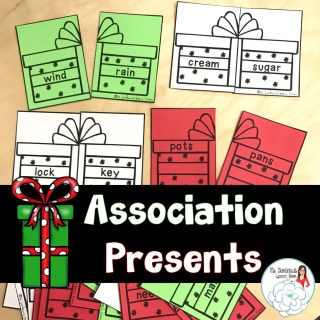
Click on the picture above or HERE to download your free gift for working on association pairs from Ms. Gardenia’s Speech Room!
For more speech and language activities created with the adult patient in mind, please click here.
Don’t miss out!
Reader interactions, leave a reply cancel reply.
Your email address will not be published. Required fields are marked *
msgardeniasspeechroom


Word Retrieval Difficulties in Adults
- Updated: January 7, 2023
Picture this.
You are excited to share your recent trip to Broadway with your family after seeing the musical, Hamilton. While you are trying to explain the plot of the play and your favorite parts, you notice that you are having difficulty communicating your main points. You find yourself looking for the right words to say but are experiencing word retrieval problems.

What is Anomic Aphasia?
Word finding difficulties can often be referred to as “tip of the tongue phenomenon”. Many individuals often know what they want to say but have a breakdown in communication due to difficulty with accessing and retrieving the right words.
Often after brain trauma (i.e. stroke, traumatic brain injury), problems with word retrieval is referred to as anomia or anomic aphasia. Often with anomic aphasia, individuals experience word finding difficulties both with spoken language and writing.
According to the National Aphasia Association , “aphasia affects 2 million Americans and is more common than Parkinson’s Disease, cerebral palsy, or muscular dystrophy”.
Anomic aphasia is a type of language disorder after acute injury in which individuals have preserved speech and comprehension but repeatedly encounter the inability to find the correct word.
Many individuals with anomic aphasia may exhibit the following characteristics to compensate their speech.
- Reformulation: You might try to rephrase your overall message in efforts to work around the words you can’t find.
- Repetitions: You might try to rephrase or repeat you previous message.
- Time Fillers: You might use “umm”, “uhh”, “a a a” during your speech with halting speech.
- Circumlocutions: You might try to define the object you are looking for to repair the communication breakdown (“you cook with it”)
- Semantic Paraphasia: You might use a word in the same category as the word you are looking for. (“fork” for “knife”)
- Phonemic Paraphasia: You might use a word with the similar sounds that resemble the word you are looking for. (“tephelone” for “telephone”)
- Neologisms: You might make up nonsense words.
In addition to the following errors, many individuals with anomia experience most difficulty with low-frequency words and names. It is possible to have difficulty with both nouns and verbs as well.
How Can Speech Therapy Help?
Although anomia is considered a mild impairment, it can be incredible frustrating for individuals as their word finding difficulties can often halt or disrupt the flow of conversation. Not only can this impact your confidence level but can make one feel burdened and embarrassed about their speech which can impact their social relationships with others.
If you or a loved one are feeling this way, our therapists at Speak Therapy can help you as we aim to provide treatment options that are rooted research and have shown to be effective for many others.
Depending on your individual needs, the following are treatment options that aim to improve neuroplasticity of the brain. Through our evidence-based practice strategies, the brain learns of adaptive ways to retrieve and process information so one may communicate more effectively.
Below are examples of techniques to improve language function in individuals with anomic aphasia.
- Semantic Feature Analysis
- Phonomotor Approach
- Constraint-induced therapy
- Melodic Intonation Therapy
Tips for Caregivers of People with Anomic Aphasia
- Allow extra time.
When communicating with an individual who exhibits anomic aphasia, allow extra time for them to get their message across. While many may try to fill in the gaps of their loved ones, this can be frustrating and make them feel incompetent. Instead of filling in their words, try to ask them to describe it so you can increase their confidence in repairing a communication breakdown.
- Acknowledge their communication.
Try to acknowledge their feelings of frustration and exhaustion by eliminating any possible distractions and noises in the area.
- Affirm their message.
After the individual has conveyed their message, try to summarize or expand on what they were saying.
If you or a loved one is experiencing word finding difficulties, schedule a free 15-minute consultation below.
Schedule a free 15-minute consultation.
Serving Patients in Illinois, Kentucky, and California

IMAGES
VIDEO
COMMENTS
Word Retrieval / Word Finding Strategies for Children who Struggle to Think of the Right Word - Speech Therapy and Home Practice Ideas. What Is Word Retrieval / Word Finding? Word finding, also called "word retrieval", is a person's ability to think of the right word when he/she needs it, such as during conversation. We all have those moments ...
Click for expressive aphasia and receptive ideas to use in your speech therapy practice. In this article, you'll find 55 aphasia treatment activities—plus step-by-step treatment guides, and free PDFs! Click for expressive aphasia and receptive ideas to use in your speech therapy practice. ... Teach patients with expressive aphasia the ...
Naming Therapy is a popular and effective app that people with aphasia can use on Apple or Android devices to practice a variety of word-finding strategies and activities. People with aphasia and speech-language pathologist love using this app because it's such a versatile tool for therapy. Like any good tool, it can be used in many ways.
In a bowl, beat together butter, sugar, egg, almond and vanilla extract; beat in flour, baking powder, and salt. Cover and refrigerate for 30 minutes. Roll heaping tablespoons of dough into finger shape for each cookie. Press almond firmly into one end for the nail.
By Miwa & Chung / December 2, 2020. In this post, you'll find 23 ready-to-use activities to treat expressive aphasia, including language expression and writing impairments. Free free to copy and print them. Or bookmark this post to use during treatment. For hundreds of evidence-based handouts and worksheets, check out our best-selling Adult ...
Once upon a time, we pulled together a resource for favourite word games used to reinforce speech therapy work or keep the mind active during the early stages of primary progressive aphasia. So many other word games have become popular since we wrote that post, so we're updating it with even more game ideas to help treat aphasia.These were suggested by other National Aphasia Association ...
I've compiled a list of ten strategies to use in therapy: Priming — Start out a therapy task with a review of all of the relevant vocabulary words in a lesson. This activates the student's categorical vocabulary knowledge and gets their brains ready for the task ahead. Vocabulary drill — Throw it back to traditional speech therapy and ...
Notes and Discussion Children with word-finding difficulties-prevalence, presentation and naming problems. International Journal of Language & Communication Disorders, 33 (4), 445-454. German, D.J. (2001) It's on the Tip of My Tongue, Word Finding Strategies to Remember Names and Words You Often Forget. Word Finding Materials, Inc.
APPS for Word Retrieval: Llama Llama Red Pajama $4.99. Llama llama red pajama is waiting, waiting for his mama. Motivate young children with this rhyming book! Word Retrieval $9.99. This app was also created by an SLP and based on research on remediation of word retrieval. iName it $14.99. iName it was created by an SLP and is specifically ...
Word Games and Aphasia. Games are a great way to continue practicing word use at home. They can reinforce speech therapy work or keep the mind active during the early stages of Primary Progressive Aphasia. Word games will keep you interacting with letters, but even visually-based activities are great for getting the conversation rolling.
Word-Finding Strategies for Aphasia. We all have little tricks we use to help us in our daily lives. Some of these strategies help us prevent problems before they happen, like setting a timer on the oven so we won't forget to take out the roast. Other strategies allow us to solve problems after they arise, like turning the TV down when we can ...
He inspires me to keep finding great evidence-based activities to help in with accurate word retrieval. On that note, this week I was talking to a good friend, Jan Schwanke, who happens to be a speech-language pathologist specializing in Word-finding (WF) therapy. She has worked closely with Diane German, doing research and presenting at ASHA.
Here are a few examples: 1. Word games. One of the speech therapy activities for aphasia is word games. Word games can help improve vocabulary and word-finding skills! Word games work best if the game is played with a focus on a specific theme (e.g., animals, food, transportation, etc.).
4. This allows for communications to remain fluid rather than halting due to word-finding difficulties. T his fluidity of language avoids awkwardness, frustration or other uncomfortable emotions for the speaker and/or listener. History/roots of circumlocution lie in stuttering, where individuals -prior to initiating speech therapy -- who
Speech Therapy Games for Preschoolers. These fun preschool games are perfect language activities for younger kids. 1. Hopscotch Word Fun. Draw a hopscotch on the sidewalk or driveway and write target words in each box. Then have the player say the words out loud to practice speech sounds as they skip through the game. Helps with: Pronunciation.
Word retrieval cuing strategies can refer to any cue, or hint, to help someone think of a word. The two primary types of cues are: Semantic: providing information about the meaning of a word or its associations. For instance, for the word "strawberry," semantic cues might include that it is a red fruit that can be eaten with shortcake.
These exercises can improve your word-finding ability and confidence over time. 9. Stay positive: It's okay to get frustrated! Affirm yourself for trying, and keep practicing strategies that work for you. 10. Take a break and breathe: If searching for the word causes frustration or anxiety, take a break.
Sometimes, we as Speech Language Pathologists forget how much word finding is in our everyday life tasks. All we have to do is draw inspiration from simple tasks and re-create therapy activities that are not only functional, but also FUN. See below for a list of "4 Functional Word Finding Tasks" to incorporate into your next therapy session.
Sudden difficulty with word finding, particularly if speech becomes non-fluent and effortful, may signal an underlying serious neurological condition like stroke or brain injury. ... Dual-task training: ... Allison has practiced speech therapy in a number of settings including telepractice, acute care, outpatient rehabilitation, and private ...
Word associations have been used in speech therapy for ages. We use them in word finding activities, as semantic prompts when a patient has difficulty answering questions, to increase vocabulary, as a memory strategy, and much more! These word association presents were created as a gift to you for your ongoing support and encouragement. I hope ...
Repetitions: You might try to rephrase or repeat you previous message. Time Fillers: You might use "umm", "uhh", "a a a" during your speech with halting speech. Neologisms: You might make up nonsense words. In addition to the following errors, many individuals with anomia experience most difficulty with low-frequency words and names.
This product is designed for Speech -Language Pathologists (SLPs) or SLP graduate students working on a divergent naming goal. This therapy technique is suited for clients with aphasia or word - finding difficulties (anomia).This product includes:• 15 divergent naming categories. Subjects: Speech Therapy.
Many vocabulary units target written vocabulary, but word finding difficulties present themselves both in writing and orally. These task cards focus on oral language. The task cards in this unit are meant as practice stimuli to use with previously taught word finding strategies or stimuli to help build and access semantic knowledge.